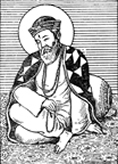Nanak
Nanak (1469-1538/9) the founder of the Sikh religion, who attempted to reconcile Hindu and Muslim thought, is variously known as Guru Nanak, Baba Nanak, and Nanak Shah. He was born in 1469 in a ksatriya (warrior) family in the village of Talwandi (modern Nankana) near Lahore in Pakistan. The village has been named Nankana Sahib after him. His father, Mehta Kalu, was a revenue collector. Nanak was the first Sikh guru and was followed by nine other gurus, the last of whom was Guru Gobind Singh (1666-1708).

Nanak learned Persian at an early age and studied briefly at Talwandi School. Leaving school, he consorted with sadhus and faqirs, Hindu and Muslim ascetics, who frequented the desert. When 12 years old, he married Sulakhni, daughter of Mular, and had two sons, Sri Chand and Lakshmi Das. For some time he worked as the accountant of an Afghan chieftain, Nawab Daulat Khan Lodi, in Jullundur district.
Here he became friendly with Mardana, a Muslim family servant, who was also a rebec player. Nanak began to compose hymns, which were put to music by Mardana.
The two friends organised community hymn singing. They also organised a canteen where Muslims, as well as Hindus of different castes, could eat together.
It is believed that at Sultanpur, probably in 1499, Nanak had a mystic experience in which he heard God ordering him to preach his message to mankind. Accordingly, he proclaimed, ‘There is neither Hindu nor Muslim’. He then devoted his life to preaching. Nanak visited the holy places of both Muslims and Hindus: Makkah, Medina, Baghdad, Singhal, Kamrup, Gaya, Benares, Kuruksetra, Brindavan, Delhi etc. In each place he preached his message, sang his hymns, discussed religion with Hindu and Muslim divines, and established a dharmashala or centre of worship. Nanak spent the last years of his life at Kartarpur. He nominated his disciple, Angad, (1504-52) as his successor.
Nanak believed in a strict monotheism and preached that there is one God who is present everywhere. He sought to combine Hindu and Muslim elements in a single religious creed. He taught the unity of God and the equality of all human beings, rejecting the restrictions of caste. He was opposed to idol worship. He called upon his followers to be pure in the midst of the impurities of the world, to avoid extreme asceticism as well as extreme hedonism, and to discard hypocrisy, selfishness and falsehood. He instructed his followers to be aware of God's presence by rising early, bathing, meditating on the divine name, and dedicating each day's activities to God. The granth shahib, the sacred scriptures of the Sikhs, contains Nanak's sayings and hymns. [Sambaru Chandra Mohanta]
See also sikhism.
